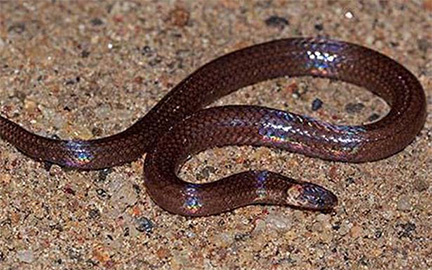Xylophis deepaki | 03 May 2021
Why in News
A tiny snake “Xylophis deepaki” has been named in honour of Indian herpetologist Deepak Veerappan for his contribution in erecting a new subfamily Xylophiinae to accommodate wood snakes.
- The common name suggested for the species is 'Deepak’s wood snake'.
Key Points
- About Xylophis deepaki:
- It is a tiny snake of just 20 cm length with iridescent scales.
- It was first found on a coconut plantation in Kanyakumari.
- It is now reported to be an endemic species of Tamil Nadu and also been sighted in some parts of the southern Western Ghats.
- It is found in the drier regions and in lower altitudes around Agasthyamalai hills.
- About Xylophis:
- It is a small genus of snakes in the family Pareidae.
- It has five species, all of which are endemic to the Western Ghats in southern India.
- Five Species: Xylophis Captaini, Xylophis deepaki, Xylophis Mosaicus, Xylophis Perroteri and Xylophis Stenorhynchus.
- These five species constitute the monotypic subfamily Xylophiinae.
- They are the only pareidae snakes found in India and the only snakes in the family found outside Southeast Asia.
- About Wood Snakes:
- These are harmless (non-venomous), sub-fossorial and often found while digging soil in farms and under the logs in the Western Ghat forests.
- They feed on earthworms and possibly other invertebrates.
- Their close relatives are found in Northeast India and Southeast Asia and are known to be arboreal (living in trees).
- Related Information :
- According to the IUCN Red List of Threatened Species, 12% of assessed snake species are listed as threatened and their populations are in decline.
- Each year, 2.7 million people around the world suffer a serious snakebite envenomation. The World Health Organization (WHO) classified snakebite as a neglected tropical disease to reduce snakebite in developing countries.
- Save The Snakes is a dedicated initiative exclusively for snake conservation and human-snake conflict mitigation.
Agasthya Hills
- Agasthya hill is a 1,868-metre tall peak within Neyyar Wildlife Sanctuary, in the Western Ghats of Kerala. The peak lies on the border of Kerala and Tamil Nadu. This peak is a part of the Agasthyamala Biosphere Reserve.
- The peak is named after Hindu sage Agastya, who is considered to be one of the seven rishis (Saptarishi) of Hindu Puranas. It is a pilgrimage centre for devotees.
- The Thamirabarani River is a perennial river which originates from the eastern side of the range and flows into the Tirunelveli district of Tamil Nadu.
- Agasthyamala Biosphere Reserve is listed on UNESCO World Network of Biosphere Reserves (2016).

